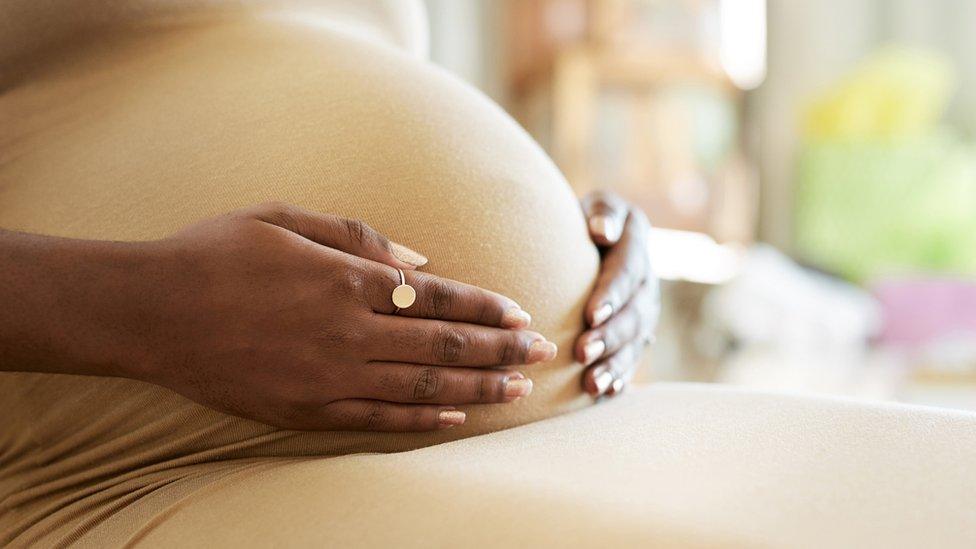Women threatened over maternity care bills
- Published

Some pregnant women visiting the UK have been wrongly told they could be denied visas for future trips unless they pay maternity care bills while in the country, the BBC has learned.
Charity Maternity Action says it has found significant failings in how debt collectors CCI Credit Management work.
CCI says it represents more than 75% of trusts and health boards, and recoups money from visitors for NHS care.
It said it was reviewing all communications with overseas visitors.
Migrants, visitors and former residents of the UK must pay for their care when they are in the UK., external
Rules on charging are aimed in part at preventing people from overseas deliberately coming to the UK to give birth on the NHS for free. Government rules compel NHS trusts to chase up debts.
However, NHS guidelines say debt should not be an automatic reason for refusal of visas - which may be needed to visit, work or stay in the UK - and only that officials "may consider" it.
Safeguards are designed to be in place to ensure that those in need of urgent care always receive it, and there are exemptions from charges for some groups of people.
'Scared and stressed'
June (not her real name), who came to the UK from overseas, received a bill from CCI Credit Management for more than £4,600 for her maternity care while she was pregnant.
She had just fled a violent relationship, was destitute and her pregnancy was considered high risk because of a past stillbirth.
"I was really, really scared. I can't tell you how stressed I was. I kept going on the internet searching about this stuff," she says.
Her letter from CCI contained the warnings about future visas. It also said debts would be taken into account for potential asylum applications. In fact, NHS debts are not considered when asylum applications are assessed.

CCI said in a statement: "For this error we unreservedly apologise.
"Please be assured that we are currently reviewing all communications with NHS overseas visitors in order to ensure that there can be no repetition of this mistake, and that further training is being provided to our teams."
The NHS trust dropped June's charges after Maternity Action contacted them.
But the charity says there are trusts who have refused to write off debts for those who are destitute or on very low incomes - despite guidance saying they can. They also say some trusts show poor understanding of the domestic violence provisions.
Christine Benson, senior legal officer at Maternity Action, said NHS trusts needed to take safeguarding seriously.
"NHS trusts must take responsibility for the debt collection agencies and the messages that they're giving to women," she said.
Maternity Action warns there is a growing body of evidence that charging for NHS maternity care deters women from coming forward for care.
'Regular check-ups'
Mary came to Britain to meet her husband - an EU national working here for seven years. But at immigration, the authorities said they believed she was involved in a sham marriage. She was allowed into the country but not given leave to remain. Her claim is still pending.
She said she did not access medical care throughout her pregnancy because she feared being charged until, at 21 weeks, she miscarried. She now owes £4,500.
It is not clear if going for scans earlier in her pregnancy would have resulted in a different outcome. But evidence suggests the kind of care someone receives can have an impact.
"It's really important that you have regular check-ups in pregnancy, and that's kind of a standard of care worldwide," says Andrew Shennan, professor of obstetrics at King's College London.
"There are many scenarios where acute management will make a big difference and turn around the outcome."
'Dangerous'
There is also evidence that some women turn to desperate measures to pay off their debts.
Ms Benson says: "Women tell us that they engage in survival sex to support themselves and their families and to repay debts, that they stay in exploitative relationships."
Dr Edward Morris, president of the Royal College of Obstetricians and Gynaecologists, says he was "incredibly concerned" that women are putting off seeking care during pregnancy and says "urgent action was needed to break down barriers".
Clare Livingstone, from the Royal College of Midwives, says that charging these women is "not only wrong, it is dangerous".
"There must be no barriers that prevent or make these women fearful of coming to our maternity services for the care they need."